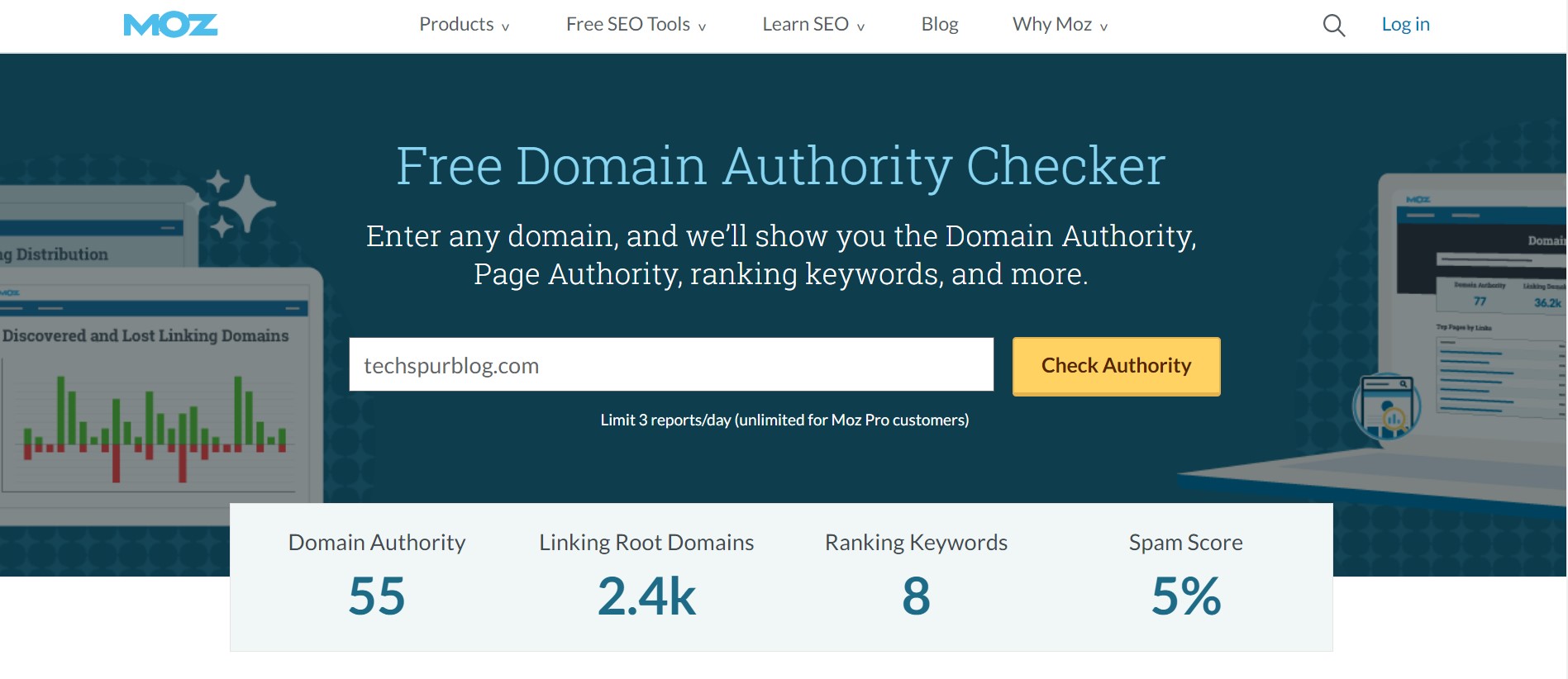Definition of Domain Authority
The Domain Authority (DA) of a website indicates its ranking on search engine result pages (SERPs). This score was developed by Moz. It is estimated that a DA score will range from one to 100, with higher scores indicating higher ranking potential.
Domain Authority is based on data from Moz’s Link Explorer and uses dozens of factors in its calculations, including the number of total links to a domain and the number of unique domains linking to a site. Domain Authority is not a metric used by Google in determining search rankings, but it is a useful tool for comparing the relative ranking potential of different websites.

Overview of Factors That Influence Domain Authority
There are many factors that can influence a website’s Domain Authority, including:
- The age of the domain: Older domains may have more authority simply because they have been around longer.
- The number of total links to the domain: The more links a website has pointing to it from other websites, the more authority it may have.
- The quality of the links pointing to the domain: Links from high-quality, authoritative websites can help increase a domain’s authority.
- The amount of traffic the domain receives: Websites that receive a lot of traffic may be seen as more authoritative.
- The presence of social signals: A website’s presence on social media platforms and the level of engagement it receives can influence its authority.
- The structure and organization of the website: A well-organized, easy-to-navigate website may be seen as more authoritative.
- The content on the website: High-quality, informative, and unique content can help increase a website’s authority.
- The use of keywords: Including relevant keywords in website content and metadata can help increase a website’s authority for those keywords.
- The website’s loading speed: Faster-loading websites may be seen as more authoritative.
- The website’s mobile-friendliness: Websites that are optimized for mobile devices may have an advantage in terms of authority.
Overall, it’s important to focus on creating a high-quality website that provides value to users and establishes the website as an authority in its industry or niche.
How to check domain authority
You can check the DA of a website using the Make Vision Clear free DA Checker tool. Simply enter the URL of the website you want to check, and the tool will provide the DA score as well as other metrics such as Page Authority (PA) and backlinks. You can also use other tools such as Ahrefs, Make Vision Clear, or SEMRush to check Domain Authority.
On-Page Optimization Factors for Domain Authority
A website’s on-page optimization helps it rank higher in search engines and earn more relevant traffic. There are several factors that can impact the performance of a webpage in search engine results, and on-page optimization involves adjusting or improving these factors in order to improve the chances of the page ranking well.
Some common on-page optimization factors include the use of relevant keywords in the page’s content, the structure and organization of the content, the inclusion of meta tags and titles, and the use of alt tags to describe images. By properly optimizing these and other on-page factors, businesses and website owners can improve the chances of their pages ranking well in search engine results and driving more relevant traffic to their sites.
Quality and Relevance of Content – Quality content is essential for improving a website’s domain authority. The content should be relevant to the topic, well-written, free from errors, and provide value to readers. Additionally, it should include keywords related to your business or industry in order to help improve search engine rankings.
Page Load Speed
Slow page load times can lead visitors away from your site before they have a chance to explore its contents. Improving page speed by optimizing images and compressing code can help keep visitors on your pages longer and boost Domain Authority scores over time.
Internal Link Structure and Navigation
Internal links are the connections between different pages within your website. A well-structured internal link structure helps search engine crawlers find and index all of the content on your site, which can lead to improved rankings. Additionally, it makes navigation easier for visitors and encourages them to explore more pages on your website.
Mobile Responsiveness
An increasing number of people use mobile devices to browse websites and search engines prioritize sites that are optimized for mobile viewing. Ensuring that your website is responsive across a range of device sizes will improve user experience as well as domain authority scores over time.
Off-Page Optimization Factors for Domain Authority
Inbound Links from Other Websites
Quality inbound links from other authoritative websites can help boost Domain Authority scores. These links should be from relevant websites and include keywords related to your business or industry in the anchor text.
Social Media Engagement & Presence
Social media is an important part of any website’s presence online, providing a platform for connecting with customers as well as potential new visitors. Building relationships on social media can lead to increased engagement, which will help boost Domain Authority over time. Here are five ways to improve your personal social media presence:
- Post regularly and consistently
- Use hashtags relevant to your industry
- Engage your followers by responding to their comments and messages
- Share valuable and interesting content that your followers will enjoy
- Make your posts visually appealing by using graphics and images.
Brand Reputation & Awareness
Developing a strong brand helps create awareness and recognition among consumers, which can lead to more people visiting your website and linking back to it from other sites. This will help improve domain authority scores over time by increasing the number of quality inbound links pointing back to your site.
Conclusion
Domain Authority is an important metric that can influence how well a website ranks on SERPs. Understanding and optimizing the factors that influence Domain Authority, such as quality content, page load speed, inbound links from other websites, and brand reputation & awareness, can help webmasters improve their rankings over time.
I’m Kristine, And an experienced copywriter with a proven track record of writing engaging, informative content. Writing content is my hobby. I enjoy writing and publishing blogs on various topics such as beauty, and lifestyle such as this. These blogs cover both unique and informative aspects.

